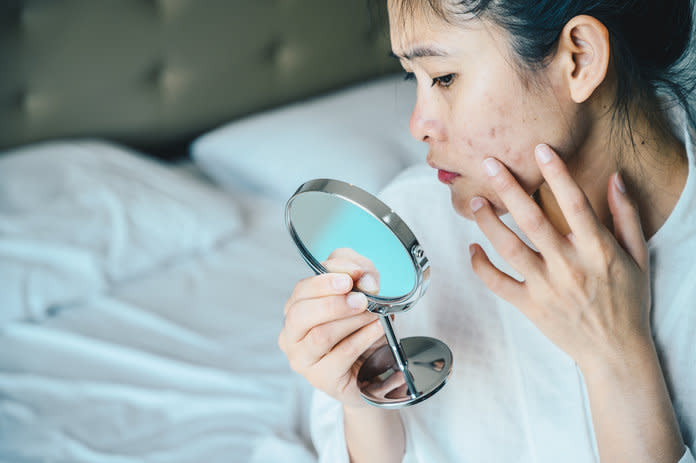How to Get Rid of Acne Scars — and Prevent Them In the First Place

If you’re one of the approximately 50 million Americans affected by acne annually, then you know the problem isn't just pesky pimples — it's what they leave behind. After all, acne scars and dark spots are two side-effects of the skin condition that can feel just as tricky to navigate as acne itself.
But while they're often used interchangeably, acne scars and dark spots are actually two different beasts that require their own plan of attack. Here, dermatologists explain how to determine if you have acne scars or dark spots, the best in-office and OTC acne treatment options to reduce their appearance — and how to avoid them in the first place.
VIDEO: How to Properly Cover A Pimple
What Are Acne Scars and Dark Spots — and How Are They Different?
For starters, let's define an acne scar. You’ll know you have one if you notice permanent indentations or raised bumps in the skin, says Joshua Zeichner, M.D., the director of cosmetic and clinical research in dermatology at Mount Sinai Hospital in New York City.
Dr. Zeichner says there are four main types of acne scars: hypertrophic scars, which are thick, raised bumps; rolling scars, characterized by undulations or divots in the skin; boxcar scars, or craters in the skin with sharp borders; and ice pick scars, deep but narrow scars that "look like the skin was stabbed with an ice pick." (Sorry for that visual.)
Dark spots on the other hand — which are commonly and confusingly referred to as "acne scars" — are not permanent and don’t cause skin thickening, which is indicative of scarring, Dr. Zeichner explains.
Dark spots are the result of post-inflammatory hyperpigmentation (PIH) which occurs when melanocytes (pigment-producing skin cells) "respond to trauma or inflammation by producing pigment that causes the injured area to turn dark," explains Tina S. Alster, M.D., director of the Washington Institute of Dermatologic Laser Surgery.
RELATED: The Under $40 Way to Get Rid of Acne Scars
What Causes Acne Scars?
Acne scars are caused by abnormal collagen production that occurs when the skin is healing itself from a pimple — and unfortunately, they can happen whether you picked at your skin or not, Dr. Zeichner explains.
That's because how acne heals has a lot do with genetics. "We don’t understand why, but some people have a more robust healing response than other people," he says. "In some cases, severe acne may heal with almost no marks on the skin; in other cases, even mild acne may leave significant scars."
That's not to say you shouldn't still follow your derm's advice and quit your pimple-picking habit since it can add to your risk of scarring, both derms say. (Plus, the bacteria that’s on your hands or under your nails increase your risk for more breakouts.)

Boy_Anupong/Getty Images
What Is the Best Acne Scar Treatment?
While the bad news is that true acne scars are permanent, there are a few derm treatments that can provide significant improvement in their appearance, Dr. Zeichner says.
Laser Treatments
Dr. Zeichner says laser treatments, like Fraxel, "work by punching microscopic holes in the skin, creating a controlled wound and allowing the skin to heal itself up in a more cosmetically acceptable manner. (The laser treatment is also commonly used to treat sunspots.)
Microneedling
Microneedling is another more recent option for treating acne scars. Like lasers, microneedling creates controlled damage to the skin and "allows new collagen to replace the abnormal scar-forming collagen," Dr. Zeichner says.
As for cost, he says you can expect laser or microneedling treatments to range between $750 and $1500 per session, depending on the surface area of skin being treated and the professional who performs the service. "Oftentimes, multiple treatments may be needed for optimal results, spaced every four to six weeks," he says, adding that patients can expect about a week of downtime.
RELATED: Everything You Need to Know About Microneedling
Do OTC Acne Scar Treatments Work?
Because the first step to preventing acne scars is avoiding them in the first place, Dr. Zeichner says there are a few over-the-counter treatments you may want to keep on hand for a pimple that just won't quit.
Salicylic Acid
An OTC salicylic acid cleanser is a good place to start to keep skin clear, according to Dr. Zeichner. He recommends Kamedis Acne Cleanser which, in addition to salicylic acid, contains soothing botanical ingredients to calm inflammation in the skin.
Beta Hydroxy Acid and Retinol
Products with beta hydroxy acid — which removes excess oil and exfoliates dead skin cells — are also a solid pick to help keep skin clear, as well as topical retinoids, like Neutrogena Rapid Wrinkle Repair Serum, Dr. Zeichner says.
If you have already existing scars, retinoids may offer another benefit. "Acne scars tend to look worse with age as the skin loses its structure," he says. "Retinol can help stimulate collagen to strengthen and better support the skin."
Sunscreen
Another crucial tool for existing acne scars: Sunscreen. It's the best way to prevent scar worsening (or color darkening), Dr. Alster says.
The bottom line with OTC products is that, while you will find a few options to help prevent acne (and, therefore, potential scarring) and even fade dark spots, topical treatments for treating true acne scars will likely require a visit to the derm.
"Early, effective treatment is your best option," Dr. Zeichner says. "If over-the-counter treatments are not working, visit a board-certified dermatologist for a prescription regimen." He recommends asking about Epiduo Forte Gel, a treatment that has been proven effective at treating acne and helping to reduce the risk of depressed acne scars.

